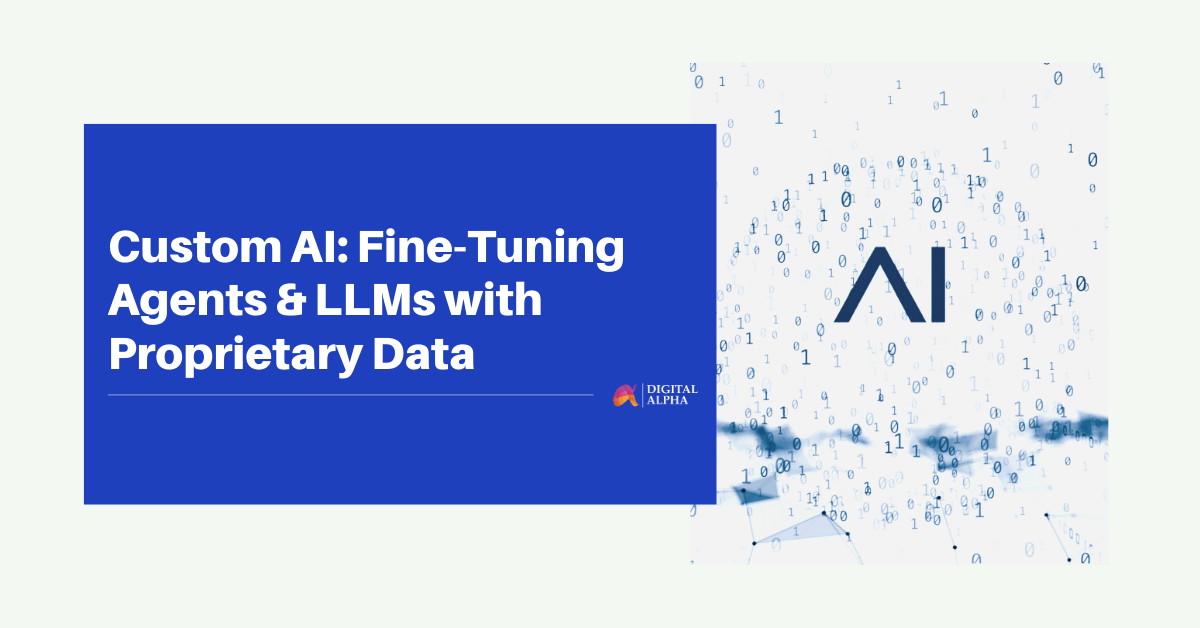Introduction
In the swiftly transforming realm of business, Intelligent Business Solutions are at the vanguard, propelled by AI Assistants and advanced AI Open Source technologies. These innovations are revolutionizing how businesses utilize data, offering unparalleled efficiency and insight.
We are actively exploring how to leverage the unique synergy between open-source Large Language Models (LLMs) and proprietary data. This approach allows us to fine-tune and craft bespoke AI agents that meet specific business requirements.
. With a focus on fine tuning and leveraging AI Open Source elements, this approach offers a potent solution for businesses seeking to enhance decision-making and operational effectiveness. Additionally, we delve into how Advanced Data Solutions can further augment these intelligent business strategies.
Leveraging Open-Source LLMs for Enhanced Business Applications
The advent of open-source foundational LLMs, like GPT variants, marks a significant leap in AI, providing a versatile foundation for intelligent business solutions. These LLMs are highly adaptable and widely accessible, facilitating the widespread application of AI across diverse industries.
Custom AI for Specific Business Requirements
The real strength of LLMs is their ability to be fine-tuned. Organizations are customizing these LLMs with their data, sharpening them to meet precise operational and strategic objectives.
Fine-tuning isn’t just about building robust AI assistants and agents. It’s the key to unlocking solutions that are meticulously adapted to the unique challenges and opportunities faced by each business.
.
Applying Tailored LLMs in Practice with Expert Input
When these fine-tuned LLMs are put to use, they redefine business operations, improving customer interaction and streamlining decision-making. For example, a bank might enhance a model for better fraud detection, while a healthcare provider could adapt it for analyzing patient information. SMEs are integral to this refinement process, ensuring the AI solutions are perfectly suited to the specific demands of each industry.
Open-source AI initiatives are spearheading the development of these advanced data solutions. This showcases the true power of open-source LLMs – their ability to be transformed into highly specialized custom AI tools, driving innovation across businesses.
Collaborative Enhancement: Open-Source and Unique Data Assets
Merging Open-Source LLMs with Exclusive Data for Superior AI Solutions
Let’s dive into the powerful collaboration that emerges when we merge open-source LLMs with exclusive data.
Such synergy results in AI solutions that are not only robust but also distinctly customized for a business’s needs. By blending the broad capabilities of open-source LLMs with the unique insights of proprietary data, enterprises can craft intelligent business solutions that stand out for their precision and relevance.
Essential SME Expertise in Custom AI Refinement
In this crucial merging process, the discernment of Subject Matter Experts (SMEs) is key. They ensure that AI agents and tools refined through this process are precise and applicable to the business’s niche. The SMEs’ profound domain knowledge is essential in tuning the AI to serve strategic and practical business purposes effectively.
Drawing Insights from OpenAI’s Breakthroughs: Tailoring Advanced Capabilities
Evolving AI’s Functionalities and Comprehension
OpenAI’s advancements, especially with models such as GPT-4, have introduced cutting-edge functionalities like customizable actions and intricate prompt instructions. These enhancements empower users to fine-tune AI’s output for particular tasks, bolstering its effectiveness across various business contexts. Moreover, enriched prompt commands elevate the AI’s interpretive skills, allowing for a more nuanced interaction, particularly useful for complex business applications.
Incorporating Novel Capabilities into Business-Centric AI Tools
Enterprises are leveraging these novel capabilities to refine their AI agents and LLMs. Customizable actions, for instance, can be engineered to execute precise functions that dovetail with a company’s operational workflow. In parallel, advanced prompt instructions pave the way for AI systems that are more adaptive and attuned to sophisticated tasks, such as exhaustive market analysis or nuanced customer service engagements.
Practical Uses and Considerations for AI in Financial Sectors
Exploring AI’s Financial and Operational Roles:
AI is revolutionizing finance and operations with its predictive prowess in risk evaluation and management, streamlining complex data analysis to forecast risks and trends with greater depth than traditional approaches.
Enhancing Efficiency in Financial Documentation:
Generative AI excels in automating intricate financial reports, synthesizing data from multiple streams to produce detailed analyses and summaries, enhancing both the efficiency and reliability of financial reporting.
Strategic Market Insights and Projections:
Through processing extensive market data, AI facilitates strategic investment decisions by identifying patterns and forecasting market trajectories, providing a strategic edge in market analysis.
Overcoming Open-Source LLM Fine-Tuning Complexities:
- System Integration: Streamlining the fusion of sophisticated AI technologies with existing open-source LLM frameworks.
- Data Merging for Refinement: Harmonizing cutting-edge AI functionalities with unique financial datasets, ensuring integrity.
- Conforming to Standards: Committing to regulatory conformity and upholding ethical AI practices.
- Innovation vs. Usability: Blending the latest AI innovations with practical, actionable solutions for finance.
- Multi-Modal Data Synthesis: Incorporating diverse data inputs such as text, imagery, and voice into a cohesive system.
- Scenario-Based Custom AI: Crafting AI agents that can replicate complex financial interactions and simulations.
- Ongoing AI Evolution: Staying abreast of AI advancements and perpetually updating models to retain relevance in finance.
Forward Outlook and Summary
Envisioning Business Intelligence Transformation
The future of business intelligence hinges on the powerful collaboration between open-source foundational LLMs and proprietary data. This marriage will fuel the creation of more bespoke, efficient, and even anticipatory AI-driven solutions across various industries.
Technological Advancements’ Influence
The march of AI progress, with breakthroughs in natural language comprehension and cutting-edge machine learning techniques, will further refine these intelligent business solutions. This will make AI even more adept at handling intricate and nuanced tasks.
Strategic Implications in Business
By integrating open-source LLMs with unique data sets, we can deploy custom AI solutions that will be a strategic game-changer for innovative businesses. This approach promises a competitive edge and fuels the kind of innovation needed to conquer complex business challenges.
